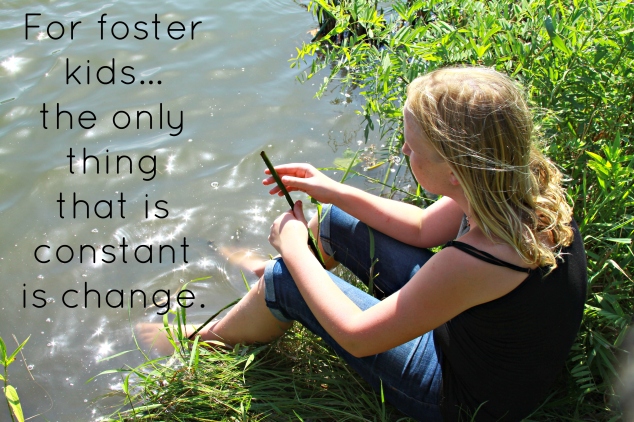
Kids like routine. They thrive on knowing what happens when. But we all know life just doesn’t stay the same – families move houses, kids change schools, friends move away or stop being friends and almost every year a child will most likely have to face a new teacher.
And then…. there are those kiddos who experience really extreme changes – like a death in the family and parental divorce. Or, maybe, a child has to leave their biologic family and has to move to fostercare or an adoptive home.
There will always be more change ahead. Change is sometimes unexpected, sometimes exciting, sometimes a relief, sometimes traumatic ~ but it’s nearly always challenging. Any child grappling with change will feel more secure and in control of their world ~ if their places, things, rituals and people remain as familiar as possible.
Whether change is a monumentally big one, or a tiny more anticipated change, here are techniques to ease the pain:
- Set expectations. It is really important to tell children what to expect, in age appropriate language so that they can prepare. That might sound like, “You’ll sleep at your foster home two more nights, before you come stay with us for a week.”
- Stick to routines. Try not to change everything at once. If a child has bedtime rituals, special books to read, or even TV shows they watch, try to keep those in place wherever possible. You can ask social workers and former foster parents about these routines.
- Reflect feelings. Kids want and need to feel validated and understood. Decide what you think they might be feeling about the upcoming change, and say it to them in a short sentence. You might say, “You are probably wondering if you will make new friends at our home (or at school/swim team/VBS).”
- Role play. Give your child an opportunity to “practice” in advance of a new or different circumstance. This will create feelings of competence and capability when the experience actually happens. You can practice how to introduce yourself, how to be brave at the doctor, etc.
- Use “I Wonder” statement. This helps a child process what might be. This can sound like, “I wonder what you might do if no one sits by you at lunch?”
- Let them grieve. When we leave something behind it’s good to talk about what we’ll miss. Always let a child appropriately mourn what they have lost.
- Establish family rituals. Religiously incorporating a Sunday game night, nighttime walks, weekend drive/bike rides, morning yoga, etc. can enhance a new “normal,” when other aspects of life feel chaotic.
- Role model. Rather than expecting your child to do all the work of forming new bonds on their own, be right there with them (if needed). You can help model how to communicate to new people in new scenarios.
- Prioritize sleep. Learning and coming to terms with the new takes a lot of energy and can be frustrating. It’s no wonder children need so much more sleep than adults! A well-rested child will handle change better.
- Expect over-reacting. When a child feels insecure and stressed, anything and everything can be harder for them to handle. Sadness about ending a play date can evoke deeper feelings of grief related to the bigger changes afoot. Some children become extra clingy and seek out more hugs and more attention in general. It’s also not unusual for children to regress developmentally with big changes.
- Give extra emotional warmth. Parents can feel like they’re walking on egg shells in the hope of avoiding meltdowns. But, when parents hold steady to limits and expectations without giving into bargaining or negotiating it can actually bring kids relief. Be nurturing and present but stick to your typical parenting philosophies.
You might also consider creating a worry box, if your child is feeling especially anxious. And if you need ideas about new family rituals, consider these family playdate ideas.
In closing, we often wish to shield our babies from the hard changes and the unknowns of this world! But, by helping them prepare, process, and plan for these events, we are setting our kiddos up for success.
